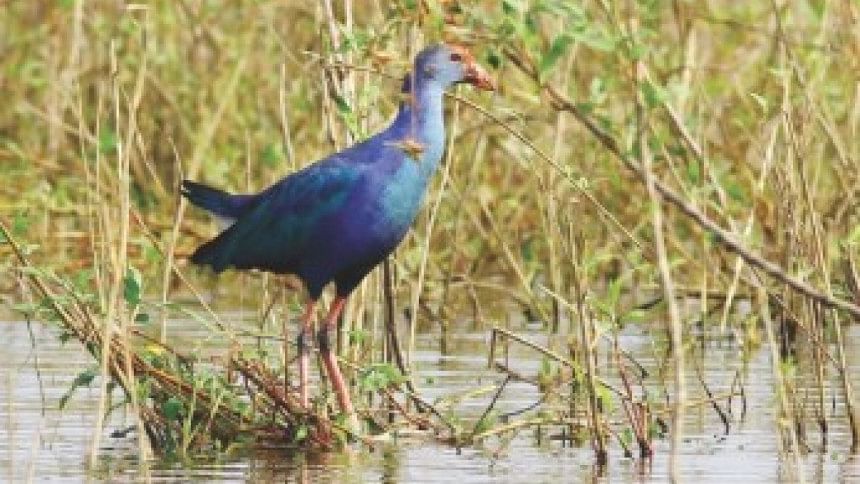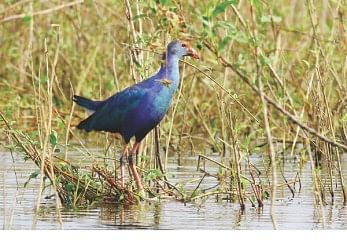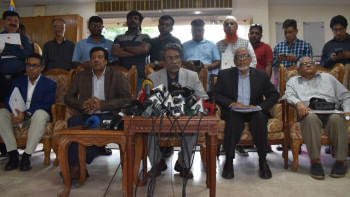The Waterland

 Purple swamp hen Here in the Waterland, people are yet to learn the trick of hiding their true faces behind well-polished material masks. They are not crowned with higher education nor do they wear foreign fragrances to veil the magnitude or odour of the little or the immoral sins they commit. When I looked at those fishermen who returned from fishing in 'no-fishing areas', I could clearly see the guilt and the fear reflecting in their eyes and expressions. They only tried to forage what they could to feed their entire families, yet they expressed a deep disgrace as if they had committed a colossal crime; something barely present in our so called well-groomed society. Winter brings blessings to the Waterland as people get plenty of fish to eat, land to cultivate and magical migratory ducks to paint the horizon over the water in wondrous colours. In monsoon, however, the entire land turns into a sea of freshwater, only the houses and water tolerant trees stand their ground almost dipping into that sea. I have always wondered how people survive in our 'haors' when everything gets inundated for months except for some patches of land to keep them dry. The day drew to an end at Tanguar Hoar and the flaming-pink sun promptly vanished over the horizon. Soon after, thousands of stars arose glittering all over the sky and reflecting as indefinite silver dots on the stagnant metallic water. The trees in the distance remained visible, drawing a dark line between the sky and the water. Ducks flew in and out of Tanguar beating their newly moulted feathers, pledging their presence even at night with the mystic melody performed by a thousand wings. I fell asleep listening to the music of nature and thinking of my nomadic life imbalanced by layers of two different worlds. As the foggy morning progressed, the Waterland had undergone yet another transformation, reducing visibility to only a few hundred meters. The fishermen were already out with their shabby baskets and small triangular-shaped fishing nets framed with two bamboo sticks. After the night's foraging, the black-crowned night herons were heading back to their roosts and the Pallas's fish eagle pair broke the dawn with their glorified calls. Taking this as our cue, we sailed towards the duck flock breaking the mist over our little-exposed skin and aquatic vegetation underneath. The water was so undisturbed that the underwater world, moulded by stratums of green, was clearly visible. The purple swamp hens were preening under the mild sunlight hiding behind the reed bed as if they were preparing themselves for the long day ahead, embellishing their thick bills with red polish and body with bright purple 'saris'. Dabbling ducks like the pintail, gadwall, wigeon and shoveler were plunging in the shallow part of the lake, tipping headfirst into the water to graze on the aquatic vegetation. As we approached, the flock of a thousand splendid ducks flushed altogether as if somebody threw a stone onto a beehive to dislodge the bees but all in one direction. The clear blue sky suddenly filled with countless dark blots and as the ducks flapped their wings it appeared like a giant pumping-heart: moving, shrinking and expanding. We then returned to our base camp at 'Golabari' where I met Shamu, a little girl who never left the Waterland in her life. She came out in the foreground in the afternoon just beside our anchored boat to wear 'kajol' over her eyelashes and pink lipstick. My request for a photograph was returned with a shy nod; in the photographs I tried to capture her innocent face, graceful walk and blissful smile. I then recalled that I saw her years ago running around in the 'Hijol bon' which arises only in winter. She was taller, darker and thinner than the last time I saw her. I asked her if she remembered noticing me earlier in the Waterland, she nodded her head and smiled softly. She goes to school now. They have a little hut in the village on the edge of the waterline. By then her father had returned from fishing and she headed off into the plains with her playmates. Perhaps this is all a simple man needs: a shelter to live under, some sustenance to eat and a daughter who goes to school. The last day of the year 2012 ended like this. There were no fireworks or fancy friends at the Waterland to rejoice the beginning of another year but it had chased away all the nothingness that had nurtured in me and supplanted within me something more meaningful.
Purple swamp hen Here in the Waterland, people are yet to learn the trick of hiding their true faces behind well-polished material masks. They are not crowned with higher education nor do they wear foreign fragrances to veil the magnitude or odour of the little or the immoral sins they commit. When I looked at those fishermen who returned from fishing in 'no-fishing areas', I could clearly see the guilt and the fear reflecting in their eyes and expressions. They only tried to forage what they could to feed their entire families, yet they expressed a deep disgrace as if they had committed a colossal crime; something barely present in our so called well-groomed society. Winter brings blessings to the Waterland as people get plenty of fish to eat, land to cultivate and magical migratory ducks to paint the horizon over the water in wondrous colours. In monsoon, however, the entire land turns into a sea of freshwater, only the houses and water tolerant trees stand their ground almost dipping into that sea. I have always wondered how people survive in our 'haors' when everything gets inundated for months except for some patches of land to keep them dry. The day drew to an end at Tanguar Hoar and the flaming-pink sun promptly vanished over the horizon. Soon after, thousands of stars arose glittering all over the sky and reflecting as indefinite silver dots on the stagnant metallic water. The trees in the distance remained visible, drawing a dark line between the sky and the water. Ducks flew in and out of Tanguar beating their newly moulted feathers, pledging their presence even at night with the mystic melody performed by a thousand wings. I fell asleep listening to the music of nature and thinking of my nomadic life imbalanced by layers of two different worlds. As the foggy morning progressed, the Waterland had undergone yet another transformation, reducing visibility to only a few hundred meters. The fishermen were already out with their shabby baskets and small triangular-shaped fishing nets framed with two bamboo sticks. After the night's foraging, the black-crowned night herons were heading back to their roosts and the Pallas's fish eagle pair broke the dawn with their glorified calls. Taking this as our cue, we sailed towards the duck flock breaking the mist over our little-exposed skin and aquatic vegetation underneath. The water was so undisturbed that the underwater world, moulded by stratums of green, was clearly visible. The purple swamp hens were preening under the mild sunlight hiding behind the reed bed as if they were preparing themselves for the long day ahead, embellishing their thick bills with red polish and body with bright purple 'saris'. Dabbling ducks like the pintail, gadwall, wigeon and shoveler were plunging in the shallow part of the lake, tipping headfirst into the water to graze on the aquatic vegetation. As we approached, the flock of a thousand splendid ducks flushed altogether as if somebody threw a stone onto a beehive to dislodge the bees but all in one direction. The clear blue sky suddenly filled with countless dark blots and as the ducks flapped their wings it appeared like a giant pumping-heart: moving, shrinking and expanding. We then returned to our base camp at 'Golabari' where I met Shamu, a little girl who never left the Waterland in her life. She came out in the foreground in the afternoon just beside our anchored boat to wear 'kajol' over her eyelashes and pink lipstick. My request for a photograph was returned with a shy nod; in the photographs I tried to capture her innocent face, graceful walk and blissful smile. I then recalled that I saw her years ago running around in the 'Hijol bon' which arises only in winter. She was taller, darker and thinner than the last time I saw her. I asked her if she remembered noticing me earlier in the Waterland, she nodded her head and smiled softly. She goes to school now. They have a little hut in the village on the edge of the waterline. By then her father had returned from fishing and she headed off into the plains with her playmates. Perhaps this is all a simple man needs: a shelter to live under, some sustenance to eat and a daughter who goes to school. The last day of the year 2012 ended like this. There were no fireworks or fancy friends at the Waterland to rejoice the beginning of another year but it had chased away all the nothingness that had nurtured in me and supplanted within me something more meaningful.

 For all latest news, follow The Daily Star's Google News channel.
For all latest news, follow The Daily Star's Google News channel. 



Comments